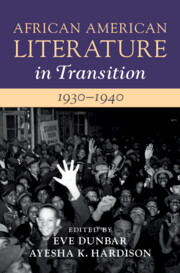Book contents
- African American Literature in Transition, 1930–1940
- African American Literature in Transition
- African American Literature in Transition, 1930–1940
- Copyright page
- Contents
- Figures
- Contributors
- Preface
- Chronology, 1930–1940
- Introduction
- Part I Productive Precarity and Literary Realism
- Part II New Deal, New Methodologies
- Chapter 4 Folklore, Folk Life, and Ethnography in African American Writing of the 1930s
- Chapter 5 New Deal Discourses
- Chapter 6 Black Theatre Archives and the Making of a Black Dramatic Tradition
- Part III Cultivating (New) Black Readers
- Part IV International, Black, and Radical Visions
- Index
- References
Chapter 5 - New Deal Discourses
from Part II - New Deal, New Methodologies
Published online by Cambridge University Press: 25 March 2022
- African American Literature in Transition, 1930–1940
- African American Literature in Transition
- African American Literature in Transition, 1930–1940
- Copyright page
- Contents
- Figures
- Contributors
- Preface
- Chronology, 1930–1940
- Introduction
- Part I Productive Precarity and Literary Realism
- Part II New Deal, New Methodologies
- Chapter 4 Folklore, Folk Life, and Ethnography in African American Writing of the 1930s
- Chapter 5 New Deal Discourses
- Chapter 6 Black Theatre Archives and the Making of a Black Dramatic Tradition
- Part III Cultivating (New) Black Readers
- Part IV International, Black, and Radical Visions
- Index
- References
Summary
The Federal Writers’ Project’s experiment in documentary modes points to the wealth of African American documentary texts offering responses to the welfare state and its attendant ideologies. These texts – neither properly belonging to a single decade nor fitting conveniently with forms of literary production we usually study – challenge the way we periodize and categorize African American literature. This chapter explores several of these intertexts: Richard Wright’s 12 Million Black Voices (1941), Roi Ottley’s New World A-Coming (1943), Arna Bontemps and Jack Conroy’s They Seek a City (1945), and Henry Lee Moon’s Balance of Power: The Negro Vote (1948). It illuminates their dialogue with the New Deal cultural projects and how Black writers reoriented how they engaged with history, urban space, and culture between the Harlem Renaissance and the Civil Rights era.
Keywords
- Type
- Chapter
- Information
- African American Literature in Transition, 1930–1940 , pp. 139 - 169Publisher: Cambridge University PressPrint publication year: 2022



